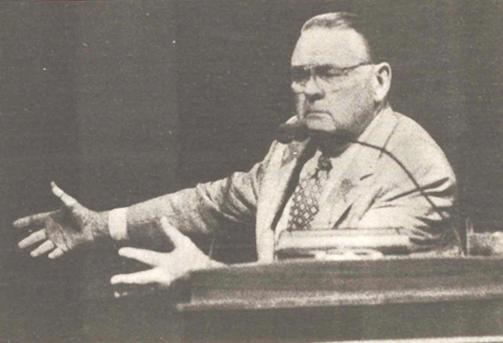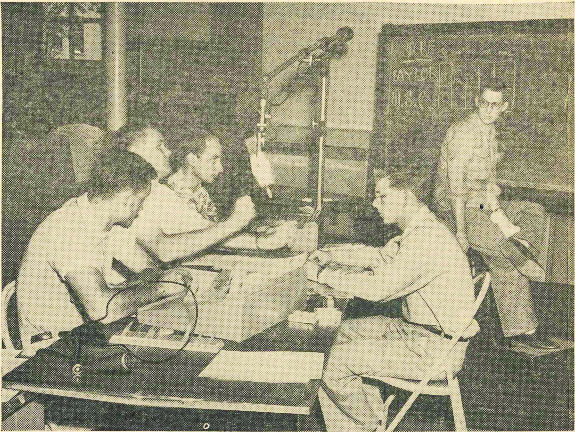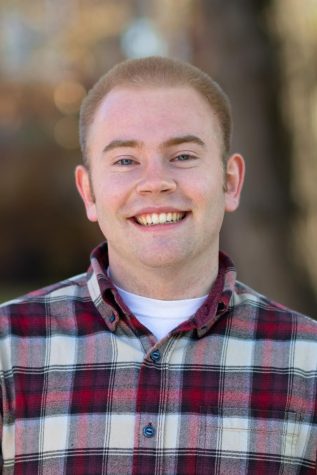Jackson leaves historic legacy
During his career, WSU alumnus announced variety of sports worldwide

Shawn Mccully | Daily Evergreen Archive
Keith Jackson led a Murrow panel discussion on the business of athletics as seen in The Daily Evergreen in the April 17, 1996 edition.
January 16, 2018
“Whoa, Nellie!”
That’s just one of the many catch phrases legendary sportscaster Keith Jackson uttered on his telecasts of events seen around the country and the world. He passed away at the age of 89 late Friday night.
For 52 years his voice filled the living rooms of millions of people as he called some of the most memorable sporting events in recent history.
Edward R. Murrow College of Communication Interim Dean Bruce Pinkleton recalls waking up and hearing the voice of Jackson come across the television.
“It seemed like for years every Saturday afternoon I was spending with Keith Jackson calling a college football game,” Pinkleton said.
Jackson, a 1954 graduate of the College of Communication, was widely remembered for his play-by-play of college football and was known as “the voice of college football.”
But Jackson wasn’t a one trick pony. He was on the call for 10 different Olympic Games, the World Series and Monday Night Football.
He coined the phrases “The Big House,” for the largest stadium in the U.S. on the University of Michigan campus, and “The Granddaddy of Them All,” to highlight the spectacle of the Rose Bowl.
During his 40 years of sports play-by-plays for ABC, he often used colorful expressions like “Fum-bull,” “Hold the phone” and “Big uglies.”
WSU football Head Coach Mike Leach said those special Keith Jackson catch phrases will live on forever.
“I think everybody can hear words of Keith Jackson, phrases of Keith Jackson echoing in the back of their mind,” Leach said. “He was the true John Wayne of sports broadcasters and especially college football.”
The first game Jackson broadcasted was in 1952 when he called a football game between WSU and Stanford University for the school radio station.
Jackson became the first American to perform a live sports broadcast from the Soviet Union in 1958 while covering a University of Washington rowing event in Moscow for Seattle’s KOMO-TV. He even traveled to Cuba to cover an amateur boxing championship, where he interviewed a ringside fan by the name of Fidel Castro.
Jackson’s final broadcast came on Jan. 4, 2006 when he was on hand for the BCS National Championship game between University of Texas and University of Southern California. He only had the opportunity to broadcast a sporting event in Pullman once in 2003, when he called a football game between WSU and University of California, Los Angeles.
Pinkleton said he couldn’t think of a single event that Jackson was a part of that stood out in his mind because he was involved with so many memorable moments. He said Jackson’s ability to entertain an audience without taking away from the game is what made him so special.
“He was able to add to these events instead of making himself the star of what was happening,” Pinkleton said, “and that is truly a rare talent.”
Leach said Jackson’s voice increased interest in college football and created excitement around the sport.
“He had a tremendous impact on college football, especially from the standpoint that he created enthusiasm in everybody,” he said. “I think he converted a lot of people to college football because of his enthusiasm.”
Leach recalls interacting with Jackson several times, saying the sportscaster was always up-to-date on Leach’s team. He said Jackson was “one of a kind” and wasn’t afraid to be himself.
“I was a little shy around him just because he is sort of an icon,” Leach said. “He’s a guy that made me excited to try and be a coach.”
Jackson and Turi Ann, his wife of 63 years, were invited back to WSU in 2014 to dedicate Keith Jackson Hall, which was named in his honor.
Jackson donated more than $1 million to his alma mater since graduating from WSU 64 years ago, according to the Spokesman-Review. Pinkleton said those monetary contributions are appreciated, but it’s the time and effort he spent mentoring students that will never be forgotten.
“He set a standard in my mind that no one meets today, and I think it’s a standard our students aspire to as well,” Pinkleton said.
Leach said Jackson’s legacy can be seen through the next generation of young sportscasters looking for a role model.
“You can feel that through what other people have taken from him,” Leach said. “Some people have implemented methods, techniques, attitudes and demeanor from him that they are not fully aware of, but they have.”
Pinkleton said Jackson’s commitment to being the best broadcaster he could possibly be is what he will remember most.
“Every time he called a game, there was a sense of professionalism and dedication to the craft of broadcasting,” Pinkleton said.
Jackson is survived by his wife and three children, Melanie Ann, Lindsey and Christopher.






















